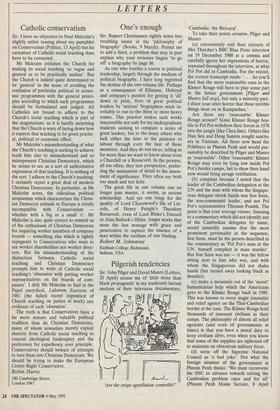LETTERS Catholic conservatism
Sir: I have no objection to Noel Malcolm's slightly unfair teasing about my pamphlet on Conservatism (Politics, 13 April) but his caricature of Catholic social teaching does have to be corrected.
Mr Malcolm criticises the Church for making its social teaching `so vague and general as to be practically useless'. But the Church is indeed quite determined to be 'general' in the sense of avoiding the confusion of particular political or econo- mic programmes with the general princi- ples according to which such programmes should be formulated and judged. All Catholics are bound to adhere to the Church's social teaching which is part of the magisterium: so it is hardly surprising that the Church is wary of laying down how it expects that teaching to be given practic- al, political or economic effect.
Mr Malcolm's misunderstanding of what the Church's teaching is seeking to achieve leads him also to misunderstand and so misrepresent Christian Democracy, which he seems to see as a sort of authoritative expression of that teaching. It is nothing of the sort. I adhere to the Church's teaching: I certainly reject a great deal of modern Christian Democracy. In particular, as Mr Malcolm notes, the ridiculous political utopianism which characterises the Christ- ian Democrat attitude to Europe is totally incompatible with Conservatism — whether with a big or a small 'c'. Mr Malcolm is also quite correct to remind us of the enthusiasm of Christian Democrats for requiring worker members of company boards — something else which is rightly repugnant to Conservatives who want to see worker shareholders not worker direc- tors. But his misunderstanding of the distinction between Catholic social teaching and Christian Democracy prompts him to write of Catholic social teaching's 'obsession with putting worker representatives on the boards of com- panies'. I defy Mr Malcolm to find in the Papal encyclical, Laborem Exercens of 1981 (the fullest recent exposition of Church teaching on justice at work) any evidence of such 'obsession'.
The truth is that Conservatives have a far more mature and valuable political tradition than do Christian Democrats, many of whom nowadays merely exploit rhetoric from Catholic social teaching to conceal ideological bankruptcy and the preference for expediency over principle. Conservatives should beware of attempts to turn them into Christian Democrats. We should be trying to make the European Centre-Right Conservative.
Robin Harris
100 Cambridge Street, London SW I


















































 Previous page
Previous page